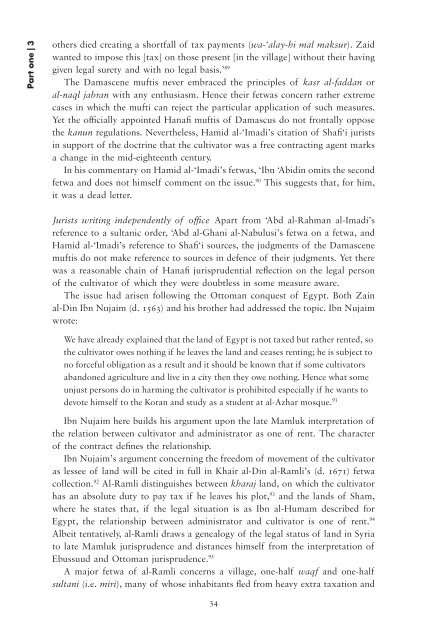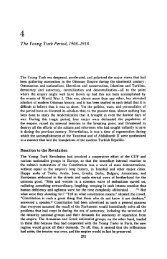Governing property, making the modern state - PSI424
Governing property, making the modern state - PSI424
Governing property, making the modern state - PSI424
You also want an ePaper? Increase the reach of your titles
YUMPU automatically turns print PDFs into web optimized ePapers that Google loves.
Part one | 3<br />
o<strong>the</strong>rs died creating a shortfall of tax payments (wa-‘alay-hi mal maksur). Zaid<br />
wanted to impose this [tax] on those present [in <strong>the</strong> village] without <strong>the</strong>ir having<br />
given legal surety and with no legal basis.’ 89<br />
The Damascene muftis never embraced <strong>the</strong> principles of kasr al-faddan or<br />
al-naql jabran with any enthusiasm. Hence <strong>the</strong>ir fetwas concern ra<strong>the</strong>r extreme<br />
cases in which <strong>the</strong> mufti can reject <strong>the</strong> particular application of such measures.<br />
Yet <strong>the</strong> officially appointed Hanafi muftis of Damascus do not frontally oppose<br />
<strong>the</strong> kanun regulations. Never<strong>the</strong>less, Hamid al-‘Imadi’s citation of Shafi‘i jurists<br />
in support of <strong>the</strong> doctrine that <strong>the</strong> cultivator was a free contracting agent marks<br />
a change in <strong>the</strong> mid-eighteenth century.<br />
In his commentary on Hamid al-‘Imadi’s fetwas, ‘Ibn ‘Abidin omits <strong>the</strong> second<br />
fetwa and does not himself comment on <strong>the</strong> issue. 90 This suggests that, for him,<br />
it was a dead letter.<br />
Jurists writing independently of office Apart from ‘Abd al-Rahman al-Imadi’s<br />
reference to a sultanic order, ‘Abd al-Ghani al-Nabulusi’s fetwa on a fetwa, and<br />
Hamid al-‘Imadi’s reference to Shafi‘i sources, <strong>the</strong> judgments of <strong>the</strong> Damascene<br />
muftis do not make reference to sources in defence of <strong>the</strong>ir judgments. Yet <strong>the</strong>re<br />
was a reasonable chain of Hanafi jurisprudential reflection on <strong>the</strong> legal person<br />
of <strong>the</strong> cultivator of which <strong>the</strong>y were doubtless in some measure aware.<br />
The issue had arisen following <strong>the</strong> Ottoman conquest of Egypt. Both Zain<br />
al-Din Ibn Nujaim (d. 1563) and his bro<strong>the</strong>r had addressed <strong>the</strong> topic. Ibn Nujaim<br />
wrote:<br />
We have already explained that <strong>the</strong> land of Egypt is not taxed but ra<strong>the</strong>r rented, so<br />
<strong>the</strong> cultivator owes nothing if he leaves <strong>the</strong> land and ceases renting; he is subject to<br />
no forceful obligation as a result and it should be known that if some cultivators<br />
abandoned agriculture and live in a city <strong>the</strong>n <strong>the</strong>y owe nothing. Hence what some<br />
unjust persons do in harming <strong>the</strong> cultivator is prohibited especially if he wants to<br />
devote himself to <strong>the</strong> Koran and study as a student at al-Azhar mosque. 91<br />
Ibn Nujaim here builds his argument upon <strong>the</strong> late Mamluk interpretation of<br />
<strong>the</strong> relation between cultivator and administrator as one of rent. The character<br />
of <strong>the</strong> contract defines <strong>the</strong> relationship.<br />
Ibn Nujaim’s argument concerning <strong>the</strong> freedom of movement of <strong>the</strong> cultivator<br />
as lessee of land will be cited in full in Khair al-Din al-Ramli’s (d. 1671) fetwa<br />
collection. 92 Al-Ramli distinguishes between kharaj land, on which <strong>the</strong> cultivator<br />
has an absolute duty to pay tax if he leaves his plot, 93 and <strong>the</strong> lands of Sham,<br />
where he <strong>state</strong>s that, if <strong>the</strong> legal situation is as Ibn al-Humam described for<br />
Egypt, <strong>the</strong> relationship between administrator and cultivator is one of rent. 94<br />
Albeit tentatively, al-Ramli draws a genealogy of <strong>the</strong> legal status of land in Syria<br />
to late Mamluk jurisprudence and distances himself from <strong>the</strong> interpretation of<br />
Ebussuud and Ottoman jurisprudence. 95<br />
A major fetwa of al-Ramli concerns a village, one-half waqf and one-half<br />
sultani (i.e. miri), many of whose inhabitants fled from heavy extra taxation and<br />
34












